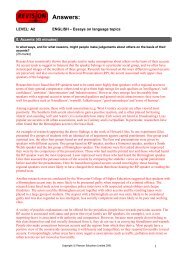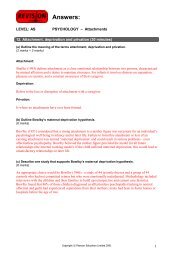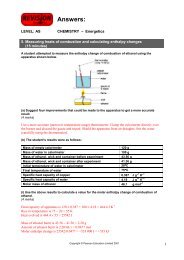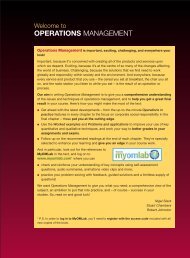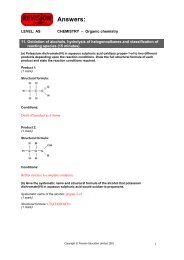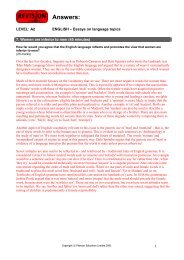The Dove Campaign for Real Beauty - Pearson
The Dove Campaign for Real Beauty - Pearson
The Dove Campaign for Real Beauty - Pearson
You also want an ePaper? Increase the reach of your titles
YUMPU automatically turns print PDFs into web optimized ePapers that Google loves.
Part 1 Marketing nowFree riders—People whoconsume more than theirfair share of a resource,or shoulder less than afair share of the costs ofits production.<strong>The</strong> global tragedy of the commons now affects us all because the common good is the wholeenvironment. Industrialisation means that our combined consumption can now destroy the airwe all breathe and the atmosphere that protects us from the sun’s rays. Marketing’s endeavoursthat result in destroying our shared environment by fulfilling the immediate needs and wants ofcustomers are clearly not sustainable. What does sustainable marketing offer?<strong>The</strong> world’s greatest generators of greenhouse gases are electricity and heat (26 per cent),de<strong>for</strong>estation (18), agriculture, industry and transport (14 each) and waste (4). In all sectors,some marketers have gained a strategic advantage, embracing the need to look to the needs oftomorrow’s markets. Denmark’s Vistas is growing fast as the world’s leading producer of windturbines but big money is catching up. GE has made ‘green is green’ their mantra. It has set upEcomagination that brings together businesses, like wind turbines, that are intrinsically green,with its other businesses that are more environmentally sound than the competition. GE isgenerally highly successful but its Ecomagination businesses are growing by 12 per cent perannum compared with 9 per cent <strong>for</strong> GE as a whole. Likewise Bombardier, which makes planesas well as being a global leader in rail technology: the Pendolino trains they make <strong>for</strong> VirginTrains already consume 76 per cent less fuel than road or local air travel, but Virgin Trains is nowpioneering Europe’s first biodiesel-powered Voyager trains that cut CO 2 by a further 14 per cent.<strong>The</strong>se companies, along with many others, including Alstom and Siemens, are in an increasinglystrong position compared with those whose response to environmental concerns wasdenial. While Alstom, GE, Siemens, Vistas and the like were embracing sustainable marketing, theGlobal Climate Coalition (GCC) of big carbon emitters aimed to ‘shoot the messengers’, castingdoubt on the science of global warning and greenhouse gas reductions. After GCC collapsed,the Competitive Enterprise Institute championed denial, running an ad proclaiming: ‘Carbondioxide: they call it pollution, we call it life.’ Even Exxon has now broken from this alignment ofdoubters. 50<strong>The</strong>se differing responses to sustainable marketing cut across industries. As a result, in theautomotive industry Toyota, Nissan, PSA Peugeot Citroën and Renault are well positioned <strong>for</strong> afuture cleaner-energy low-cost exposure to the changing market and strengths in low-carbontechnologies. In contrast, BMW, Ford and GM, with their dependence on SUV and sporty cars,are highly exposed. As GM’s vice-president of R&D now recognises: ‘This industry is 98 per centdependent on petroleum. GM has concluded that that’s not sustainable.’ 51Indications are that marketers cannot rely on the behaviour of today’s consumers to providethe market signals to shift to sustainable marketing. A few people are committed to ethicalconsumption and many enjoy the warm glow of doing good when they buy, but consumers areconfused and there is little sign that they will buy ethical products that cost more or per<strong>for</strong>mless well than the norm. It is a free-rider problem: most wealthy consumers are enjoying beingfree riders where their immediate descendents and the world’s poor pay. 52“Consumers are enjoying being free riders where their immediate descendentsand the world’s poor pay.Today’s free-riding consumers are benefiting from an externality that has a time dimension.<strong>The</strong> people who will pay are not born yet, so why bother? Environmentally damaging goodscarry with them a double incentive not to act now. Besides, the negative externality is tomorrow’sproblem, so we can free-ride. If everyone else constrains their lifestyle or invests to cut back theirenvironmental impact, we can benefit from a better environment without contributing anything.But what if we all free-ride? As an example, BA’s customers have the chance to pay just £5 tooffset the carbon emissions of a flight from London to Madrid but fewer than 1 per cent do. <strong>The</strong>link between our actions and the consequences are so remote that someone else can pick up thetab. Even when the economic benefits accrue directly to consumers, few respond.“112



